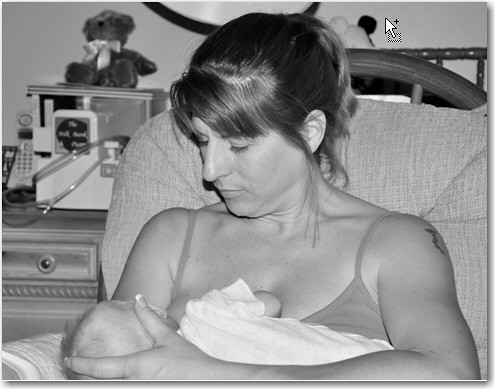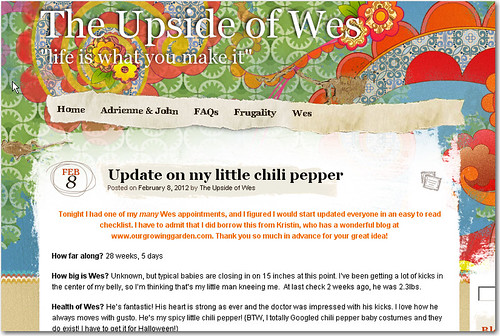-------------------------------------------
One of the many widely-held misconceptions about Down syndrome is that babies with Down syndrome won't be able to breastfeed. Though breastfeeding a baby with Ds can be challenging, I would like to offer some encouragement to expectant and new moms of babies with Down syndrome who would like to breastfeed.
I'm not a medical professional or a trained lactation expert… but rather just a mom who, before my own son was born with Down syndrome, successfully nursed five babies for the long haul, and was determined to breastfeed my sixth baby, Down syndrome or not.
Not every baby with Down syndrome is faced with difficulties in breastfeeding but for those who are, the two main things that hinder breastfeeding are low muscle tone, and immediate and prolonged separation of mom and baby due to issues the baby might have that require a stay in the NICU. Finnian and I were challenged with the latter issue.
Finn was born at home, where he stayed for roughly half a day before we had to rush him to the ER because he was spitting up blood. In the first few hours after his birth, he was so sleepy that he never really woke up enough to latch on well and nurse. In the ER he was hooked up to all kinds of tubes, wires, and monitors and by that evening, he was diagnosed with a duodenal atresia. He was admitted to the NICU and had corrective surgery the following morning.
For several days, while his intestines healed from this major gastric surgery, he was fed intravenously and I was not allowed to attempt nursing. My milk came in during that time, and I began pumping at regular intervals around the clock and storing my milk for him. I was told that he'd most likely have to start with bottle feeding, and it became clear to me pretty quickly that we had some major challenges ahead of us.
I was heartbroken at the prospect of not being able to nurse Finn. For me, breastfeeding is a huge part of how I mother my babies, and I could hardly fathom not being able to share that with Finn.
When Finn was cleared to tolerate oral feeds about a week after his surgery, the nurses in the NICU were supportive of my desire to breastfeed; however, it was frustrating because everything in the NICU had to occur by the clock and by the numbers. He had to be fed on the schedule the nursing staff set down for him, and if I couldn't make it to the hospital in time, he was given a bottle (of my breast milk). If I was there to nurse him, he had to latch on within a certain number of minutes or I was made to call it quits and give him a bottle. The same went if he didn't take the prescribed number of ounces in the time allotted. It was all very stressful, and I spent a lot of time crying. The stress and the pressure didn't go very far in helping us get a good breastfeeding relationship established. There were lactation consultants on hand, and they were helpful, but all in all, it was a frustrating, discouraging situation.
Convinced that Finn would do better at home where I could nurse him around the clock without the constant supervision and vigilance of the nursing staff, I couldn't wait to get him out of the hospital. By the time he was discharged twelve days after he had been admitted, we were nursing, but it was hit or miss. I was using nipple shields because he seemed to do better with the rigid shape of the shields, which were similar to the bottle nipples he was already becoming used to. I would nurse him and then my husband would follow up with a bottle of expressed breast milk to make sure he was getting enough.
As I suspected, he did seem to do better once we got home, and within a couple of days I was able to ditch the nipple shields. He was latching on well (it seemed), and nursing well (it seemed). It wasn't long before we stopped supplementing with bottles of breast milk, and I was exclusively nursing him.

It soon became clear that he wasn't gaining weight. He had weighed 6 pounds at birth, lost the typical several ounces that babies lose directly after birth, then lost more after his surgery. I think in the NICU he went as low as around 5 pounds. By the time he was discharged, he was back up to his birth weight, but after a week at home, he was still at 6 pounds. Then after another week or so, he had only gained another ounce or two.
I'll never forget our pediatrician - whom I love for the most part - sending me home with several cans of formula and telling me that Finn most likely just wasn't going to ever be able to nurse well because of his Down syndrome. I was devastated. None of my babies had ever received formula, and I felt like a failure.
Fortunately, my midwife insisted that: (a) if I was going to supplement, it should be with the breast milk I had stored while Finn was in the NICU, and (b) I needed to find a really good lactation consultant. I did both. I found a lactation consultant who refused to believe that Finn couldn't nurse simply because he has Down syndrome. Yes, it was going to be a challenge, but it could be done, she insisted.
The LC set me up with a supplemental nursing system (SNS) and spent oodles of time with me and Finn over the course of several appointments, observing us and giving me tips on positioning, etc. With her help, Finnian and I were able to overcome the hurdles that were in place.
Despite my perception that Finn had learned how to latch and nurse well, it apparently wasn't the case, and because he actually wasn't latching properly and his suck wasn't great, my milk production went down, so he wasn't getting enough, and the cycle was set in motion. Even after Finn’s latch improved, my milk production did not recover and I began taking herbal supplements to increase yield. Supplements helped to a degree for a time, but eventually I turned to Domperidone which helped immensely, and was the final missing puzzle piece for us.
Finn nursed until he was thirty-three months old when he self-weaned, which was bittersweet for me because he was going to be our last baby (he is not though... you never know what life is going to throw at you!). Getting breastfeeding going was definitely an uphill battle for us, but through perseverance and good support, we were able to make it work, and it was completely worth it to me.
---------------------------------------------
Tune in next week to get the specifics you’ll need to overcome complications and breastfeed your baby with Ds.




